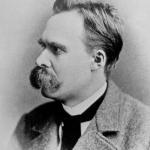We are a culture that likes celebrities. Making art is one way to become a celebrity, though not the easiest. Fans gather around writers whose weaker works even find defenders in fandom: see Joss Whedon about Dollhouse.
Yet in another way, the artist, even the biography of the artist, is less important than the work.
I was blessed enough to study Homer in graduate school after scholars got over their destruction of the text looking for “influences” and searching for an author. Who wrote Iliad? Was the author of Iliad the same person as the author of the Odyssey?
Who can be sure? Who cares?
The Iliad and the Odyssey as we have them are brilliant works. I am thankful my professors (Dr. Alfred Geier!) read the text as we have it before turning to endless theorizing about sources and writers.
Of course, speculation about authors of ancient works is the fountain of eternal dissertation ideas since falsifying any plausible idea is unlikely. A sufficiently clever “scholar” can weave together speculation from a bit of text as quickly as Fox Mulder could find signs of aliens in a trampled corn field. On the X-Files, however, the aliens often come to confirm Mulder’s wild ideas, while the alternate authors to Homer stay out there in left field.
The Truth is Out There
This brings me to a question from my summertime interlocutor M*:
36. How do you know who the authors of the New Testament actually were (or any authors of the Bible, for that matter)?
First, many New Testament documents claim an author (Paul in Romans).
Second, other documents contain clues to the other author such as the Gospel according to John where the perspective on Jesus moves from that of John the Baptist to the disciple whom Jesus loved. It doesn’t take Mulder level speculation to guess the author.
Third, church history preserves traditions about the author. Without evidence to the contrary, I see no good reason to doubt such claims.
Finally, nobody knows who wrote Hebrews yet the early Church recognized the inspiration in the text.
The epistles we have are very old compared to the formation of the Church. A heretic was referring to the epistle to the Ephesians by 150! We have a fragment of the Gospel of John from 120.
The phenomenon is what must be explained and we have an explanation: Jesus rose from the dead, His students and friends were gobsmacked and the world was never the same. Whoever collected the stories they told, these stories have the ring of recollection and not of myth—and I read both for a living.
I generally accept traditional authorship, because arguments to the contrary always seem assumption laden to me. One has a manuscript like Ephesians that claims to be from Paul and we know it existed by the late first century. We have no external evidence that Paul did not write Ephesians.
As with Homer scholars, it is easy to pick at the traditional author because you do not have to propose an alternative! In the case of Homer, we have texts that are centuries after the “author” lived . . . in the case of the New Testament authors, decades.
Centuries are very different from decades!
We are not mere fanboys in the Christian faith
I am not sure what a skeptic thinks is at risk when we discuss authorship. We do not care as much who God used to write a great, inspired text as we care to read it and learn. We were willing, after all, to accept a book with an apostolic flavor when we were not sure what apostle was behind the book (Hebrews).
Isn’t authorship pressed in order to undercut the claims that the Gospels are based on eyewitness testimony to the events? I suspect so and yet the skeptic’s next move will be to claim that eyewitness testimony is oft in error. As far as it goes, I suspect that if Mark was not written by Mark, then it almost surely is a collection, by a community of students, of stories based on other written accounts, sermons by Mark, and stories that had stood the test of time. Recollect there would have been people alive from the time of Jesus when the books were put together.
A community putting together what they took to be the truth sounds very good to me! We know Luke, or whoever wrote Luke/Acts, claims to have adopted that very model.
This much we know: Jesus surely lived and was crucified by Pontius Pilate. Jesus’ followers were all over the ancient world within decades of His death claiming He was alive. This was not normal Jewish behavior!
If I were to be a New Testament writer’s fanboy, I would follow John Mark. My parents named me after him and his life has been a bit like my own: the youth with a great many chances who blew it and then became useful for service. His very name echoes my career studying Jerusalem and Athens: John (Jewish wisdom) and Mark (Roman might). Yet if John Mark did not write the Gospel of Mark, if his faithful students in Alexandria put together his stories and sermons, then I am not crushed.
The book of Mark is what I really have to study, love, and learn. The Holy Spirit is here now to help me read the great text.
Let’s read Mark!
——————
*M is a non-Christian that sent me 55 questions earlier this year. He has asked that I not reveal his or her name. I will write as if “he” is a male, but this is for convenience. I do not know if I will get to all his questions. I try to limit my answers to hundreds and not thousands of words. Here are questions 1, 2, 3, 6, 7, 8, 12, 14, 16, 17, 19, 20, 23, 26, 27, 28, 33, 34, 35, 36, 37, 38, 39, 40, 44, 47, 54 , and 55.
This post was edited by Rachel Motte.

















